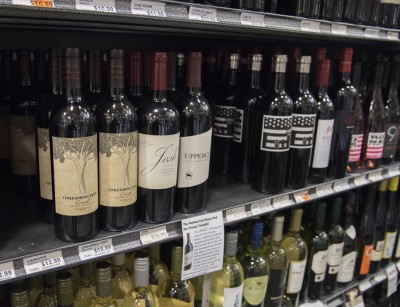
The smell of alcohol makes it more difficult for people to control their impulses to consume alcohol, according to a study published Thursday in the journal Psychopharmacology.
Rebecca Monk, leader of the study and a professor at Edge Hill University in England, asked participants to either wear an alcohol laced or a non-alcohol-laced face mask. Participants were then asked to press a button when the letter K or a picture of a beer bottle was shown on the screen. The objective was to measure the frequency of participants wrongly pressing the button. Monk found that more participants wearing the alcohol-laced mask pressed the button incorrectly.
“Results suggest that participants found it harder to withstand the urge to react when wearing a facemask which had been treated with the alcohol,” she wrote in an email.
Monk stated that she decided to research smell as it relates to alcohol in order to fill a void. She claimed that there has not been much research in this area before, but it is commonly known that smell is a powerful sense.
“The smell in an old cupboard can remind us of a fond relative, for instance,” she wrote. “The same is true for alcohol. I know some people who cannot stand the sight nor the smell of a certain drink, because it reminds them of a past, unpleasant, experience resulting from drinking too much of that drink.”
Monk added that humans’ ability to control their behavior can be reduced after certain pressures, but at the same time, limitations in inhibitory control have been positively associated with drinking levels.
“Our research therefore sought to combine the existing literature with what we know anecdotally about smell,” Monk wrote. “We wanted to … examine whether the smell of alcohol can impact, or even diminish, our ability to control our behavior, as we predicted it would.”
This study also serves to further understanding on substance abuse in a variety of contexts.
“Alongside previous research in this area, these findings help us to understand more fully the observed variations in drinking in different contexts,” Monk said. “If beliefs about alcohol, and our ability to control our behavior, vary as a result of our current location, and the associated sights, sounds and smells, then we can hopefully get a better understanding of why people drink differently in varying contexts.”
While drinking is frequently associated with social activity, one of these contexts is solitary drinking.
“‘Solitary alcohol abuse’ may be said to have more negative connotations,” she said. “However, by conducting this sort of research, it is hoped that we can get a wider understanding of varying types of drinking.”
The study has important implications. The findings, according to Monk, can be used to improve understanding of alcohol abuse and its treatment. Monk wrote that the research she and her team conducted suggests that there needs to be more awareness of subtle contextual cues, such as the smell of alcohol, that influence the level of control people possess.
“Interventions may therefore have limited long term utility, outside of the context in which they are implemented, if people experience a reduction in their control abilities as soon as they go into the real world and smell alcohol,” she wrote. “By improving our understanding of the drivers of alcohol consumption in this way, and how contextual factors may have a variable effect on such processes, we hope that we can better inform such interventions.”
Chris Pesce, chief marketing officer of Sober Grid, noted that it is not always practical to avoid locations where stimuli are present.
“In situations where people who are trying to abstain from alcohol know that they are going to be in the presence of it and be exposed to olfactory and visual stimuli, it makes sense to have a plan in place to be able to connect with another sober person for support,” Pesce said.
Sober Grid is a location-based mobile app that connects sober people with one another.
“The benefit of an app like Sober Grid is that it allows people to immediately tap into a supportive, sober community at a moment’s notice when the need arises,” he said. “It also allows them to do so discretely, and without having to excuse themselves to make a phone call.”
Tibor Palfai, a psychology professor in Boston University’s College of Arts and Sciences, stated that the future of alcohol and drug interventions is web-based and mobile interventions.
“Given the potential for reducing costs, increasing access and minimizing stigma, there has been a tremendous increase in research in this field,” Palfai wrote in an email.
Jack Kelly, CEO of iRecover, which is another app aimed to help people recover from addictions, said that while efforts have been made to address the stigmatization of addiction, they need to be more consistent.
“The stigma is leaving, which is awesome,” Kelly said. “This is not a criminal issue, but a health issue.”

















































































































